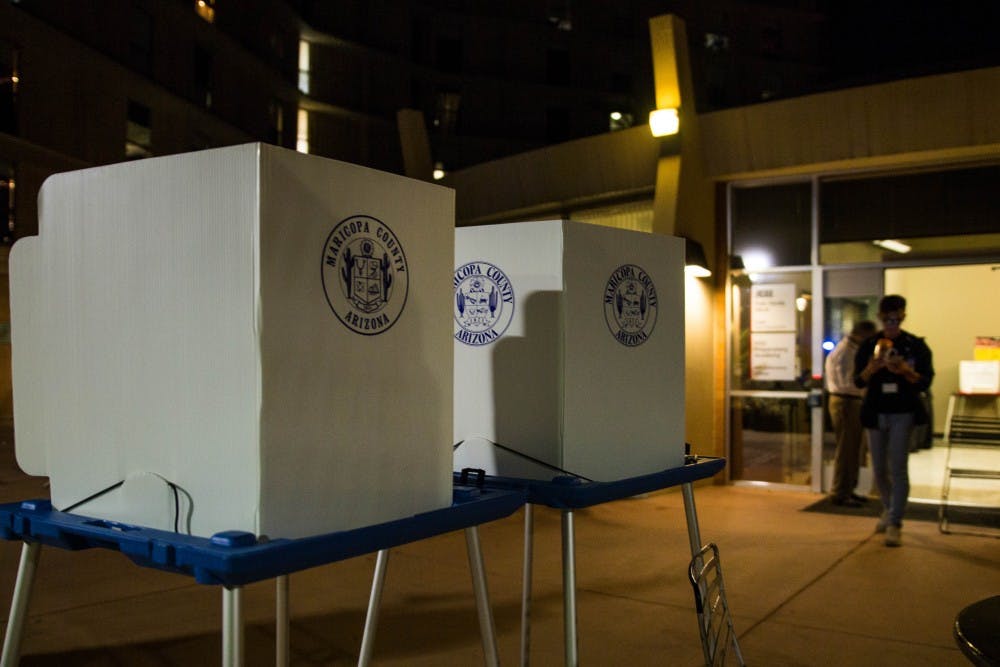Leaders of campus political clubs largely agree Election Day is an unpredictable event that could spark campaigning, policy writing and lobbying opportunities for later in the year.
Young voters are excited to see the election come to a close but agreed drawing conclusions from results announced Tuesday isn't something they're planning to count on or trust. Despite fears of civil unrest and refusal for a transition of power in the highest office on the ballot, students are excited to participate.
Out of the 4.2 million registered Arizonans, those who have yet to cast their ballot for president, senator, two propositions and for some, sheriffs, state legislators and congress members will have one last chance to do so Tuesday.
READ MORE: A 2020 Arizona general election voting guide for ASU's campuses
Student-to-student voter engagement
Emma Burns, vice president of membership for Young Democrats of Arizona and an NAU junior studying environmental science and criminology, said she's already gotten her peers to submit their ballots.
"We've been really trying to push voters to turn in their ballots early," Burns said. "Our main goal is to just make sure that people are empowered at the polls tomorrow."
State election officials have already received more than 2.3 million ballots, just shy of the 2.6 million total ballots that were cast in the 2016 election. Almost 700,000 more people have registered to vote in the state compared to 2016.
Joe Pitts, president of College Republicans at ASU and a sophomore studying business, voted early by mail and has encouraged friends and classmates to make an informed vote, pointing them to resources about who is running where they live.
Voter turnout is up this year but especially among young people. In Texas, people aged 18 to 29 have cast almost two-thirds as many early votes as they did in 2016. In other states like Florida, North Carolina and Pennsylvania, young voters have already exceeded 2016 margins.
According to a POLITICO newsletter report from last week, the share of early voters between 18 and 29 is up 19% in Arizona compared to 2016. In the report, Tufts University’s Jen McAndrew said the increase is due to social movements, social media engagement and optimism about the power of one's vote.
Clay Robinson, vice president of College Republicans, said he spent his summer on social media making jokes and memes about candidates and party platforms hoping to start a conversation.
"If you're (advocating for a political party) on social media, it's much more likely to get traction. And it's an easy way for myself, or political groups or campaigns, to gain traction," said Robinson, a sophomore studying economics and civic and economic thought and leadership.
Robinson said waiting for Election Day has felt longer than it needed to be and is hopeful for candidates representing their party affiliation in multiple races.
The race will continue
But the race is not over, and some predict there will not be a clear winner on Tuesday as not all votes will be counted by the end of the day.
Pitts said he hopes results won't be announced prematurely and candidates in all races will be civil.
"It's important that you have that structure where you're not preeminently or surely declaring any race," Pitts said. "If that does occur, it's going to cast a lot of doubt on the American democratic system."
David Howman, president of ASU College Libertarians, said he's hopeful going into Tuesday. Like many others, he's not going to look for solid results on Election Day but doesn't "expect there to be any real problem getting an accurate count. It's just not what we're used to," Howman said.
Looking forward to seeing hard work pay off, Burns said members of YDA, a statewide club, will be stationed near popular and frequented polling locations with water, snacks, extra masks and other first aid items.
Howman said rather than results, he's going to pay attention to spin from Republican and Democratic pundits and campaigns as they remind voters to stay calm and wait. Howman doesn't expect the days, or maybe weeks, after Election Day to reflect positively on the parties, rather "more and more people will become dissatisfied."
"No matter what's going to happen, we're still going to have a lot of work to do," Pitts said. Win or lose, he's excited about the prospect of hosting candidates to discuss creating a platform, raising money and reaching out to constituents.
Despite work leading up to the election, the real work, all students said, starts after races are called.
"Elections are just a stepping stone," Burns said. "The entire process of writing policy and lobbying for groups young people care about comes next."
Reach the reporter at pjhanse1@asu.edu and follow @piperjhansen on Twitter.
Like The State Press on Facebook and follow @statepress on Twitter.

Piper Hansen is the digital editor-in-chief at The State Press, overseeing all digital content. Joining SP in Spring 2020, she has covered student government, housing and COVID-19. She has previously written about state politics for The Arizona Republic and the Arizona Capitol Times and covers social justice for Cronkite News.




